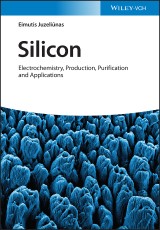Details

Silicon
Electrochemistry, Production, Purification and Applications1. Aufl.
|
124,99 € |
|
| Verlag: | Wiley-VCH (D) |
| Format: | |
| Veröffentl.: | 29.11.2022 |
| ISBN/EAN: | 9783527831906 |
| Sprache: | englisch |
| Anzahl Seiten: | 288 |
DRM-geschütztes eBook, Sie benötigen z.B. Adobe Digital Editions und eine Adobe ID zum Lesen.
Beschreibungen
<b>Silicon</b> <p><b>The expert reference on sustainable and energy-efficient production of photovoltaic-grade silicon materials</b> <p>Electrochemical methods, in particular molten-salt approaches, are a cost-effective, energy-efficient, and highly sustainable approach for producing solar-grade silicon. Surface micro- and nanostructuring methods for effective light harvesting, silicon electrorefining in molten salts, electrodeposition of photoresponsive films, and other related processes are likely to replace conventional carbothermic production methods. <p><i>Silicon: Electrochemistry, Production, Purification and Applications</i> presents an up-to-date summary of recent experimental and technological developments in the field, highlighting sustainable and energy-efficient processes for high-grade silicon production for a variety of photovoltaic and energy applications. Presented in a logical and concise format, this authoritative volume details the fundamental properties and technical processes of metal-grade silicon production and describes the various electrochemical methods for high-grade silicon production. Topics include silicon surface modification, chemical-physical structuring, porous and black silicon, electrochemical Si surface structuring and anodizing in molten salts, and more. <ul><li> Reviews the sustainable and energy-efficient production and purification of photovoltaic-grade silicon materials</li> <li> Summarizes recent progress in sustainable processes for high-grade silicon production</li> <li> Describes electrochemical methods for silicon production such as electrolysis, electrodeposition, and electrorefining</li> <li> Concludes with a discussion of future challenges and opportunities </li></ul> <p>Written by a leading researcher in the field, <i>Silicon: Electrochemistry, Production, Purification and Applications </i>is a valuable resource for chemists and material scientists in academia and industry, particularly those working in sustainable energy development, photovoltaics, light harvesting efficiency, solar-to-chemical conversion, and production of solar-grade silicon, batteries, photoelectrodes, or silicon-based semiconductors.
1. Introduction<br> 2. Historical overview of silicon production<br> 3. Physical and chemical properties of silicon<br> 3. Production of metal grade silicon<br> 4. Refining of silicon: from metal to electronic grade<br> 5. Basics of semiconductor electrochemistry, photo-effects<br> 6. Silicon equilibrium and electrolysis in aqueous electrolytes:<br> - Thermodynamic stability, native oxide<br> - Surface termination effects<br> - Photoelectrochemical effects<br> - Anodic polarization, surface passivation<br> - Cathodic polarization<br> 7. Porous silicon: formation, mechanisms and morphology<br> - Etching in fluoride solutions<br> - Etching in alkaline solutions<br> 8. Electro-deoxidation of solid compounds in molten salts<br> 9. Silicon electrochemistry in molten salts - toward low-carbon economy<br> 10. Voltammetry and basic reactions of silicon as an electrode in molten CaCl2<br> 11. Electrochemical production of Si in molten CaCl2 from SiO2<br> 12. Electrodeposition of thin Si films<br> - Electrodeposition in molten fluoride electrolytes<br> - Si films from molten CaCl2: photoactive layers and p-n junction<br> 13. Electrodeposition of Si from ionic liquids and organic solvents<br> 14. Purity concerns and solutions<br> 15. Silicon electrorefining in molten salts<br> 16. Silicon surface structuring<br> - Chemical-physical structuring<br> - Electrochemical Si surface structuring in molten salts<br> -- Anodizing in molten salt<br> -- Microcolumnar and amorphous structures<br> -- Electro-Deoxidation of SiO2 layers<br> 17. Black silicon<br> 18. Synthesis of nanowires and implications for Li-batteries production<br> 19. Silicon compositions - perspectives for semiconductor production<br> - Silicon carbide<br> - Silicides<br> 20. Concluding remarks, future opportunities and challenges<br> 21. References
<p><i><b>Eimutis Juzeliūnas</b> is Principal Research Associate and Head of the Department of Electrochemical Materials Science at the Centre for Physical Sciences and Technology in Vilnius, Lithuania. From 2009 to 2014, he was a Marie Curie Fellow at the University of Cambridge, UK. He has published more than 100 papers in peer-reviewed journals, holds two patents, and has presented his research at 40 international conferences. He has received research fellowships from the Alexander von Humboldt Foundation, the American Chemical Society, the Fulbright Programme, and the European Commission.</i>
<p><b>The expert reference on sustainable and energy-efficient production of photovoltaic-grade silicon materials</b> <p>Electrochemical methods, in particular molten-salt approaches, are a cost-effective, energy-efficient, and highly sustainable approach for producing solar-grade silicon. Surface micro- and nanostructuring methods for effective light harvesting, silicon electrorefining in molten salts, electrodeposition of photoresponsive films, and other related processes are likely to replace conventional carbothermic production methods. <p><i>Silicon: Electrochemistry, Production, Purification and Applications</i> presents an up-to-date summary of recent experimental and technological developments in the field, highlighting sustainable and energy-efficient processes for high-grade silicon production for a variety of photovoltaic and energy applications. Presented in a logical and concise format, this authoritative volume details the fundamental properties and technical processes of metal-grade silicon production and describes the various electrochemical methods for high-grade silicon production. Topics include silicon surface modification, chemical-physical structuring, porous and black silicon, electrochemical Si surface structuring and anodizing in molten salts, and more. <ul><li> Reviews the sustainable and energy-efficient production and purification of photovoltaic-grade silicon materials</li> <li> Summarizes recent progress in sustainable processes for high-grade silicon production</li> <li> Describes electrochemical methods for silicon production such as electrolysis, electrodeposition, and electrorefining</li> <li> Concludes with a discussion of future challenges and opportunities </li></ul> <p>Written by a leading researcher in the field, <i>Silicon: Electrochemistry, Production, Purification and Applications </i>is a valuable resource for chemists and material scientists in academia and industry, particularly those working in sustainable energy development, photovoltaics, light harvesting efficiency, solar-to-chemical conversion, and production of solar-grade silicon, batteries, photoelectrodes, or silicon-based semiconductors.


















